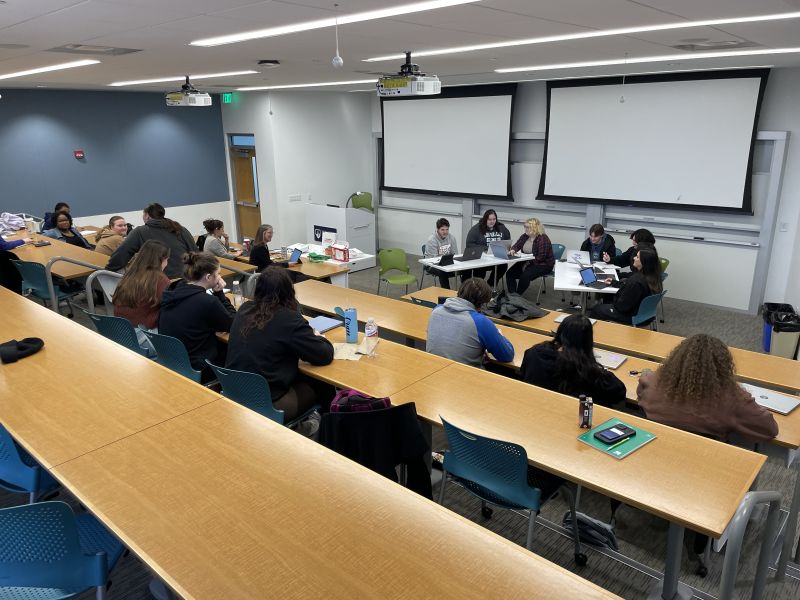Share this Story
Fight Club: Debate and Civil Discourse
January Term humanities course aims to develop media literacy, better citizens
University News | January 31, 2024
It’s called Fight Club, but don’t let the name fool you. Drs. Kellie Holzer and Leslie Caughell co-teach this course, and they’ve made it their mission to teach students how to engage in vigorous debate without getting nasty. 
HUM 261, Fight Club: Debate and Civil Discourse, offers an interdisciplinary approach to critical thinking that introduces students to certain aspects of speech and debate, while delving into issues that are potentially divisive such as book bans and race relations.
“We live in a large and diverse democracy, and if we want that democracy to function well, citizens need to engage the perspective of others and understand that their own opinions may not always be right,” says VWU Associate Professor of Political Science Leslie Caughell. “In this course, we are stressing the importance of sharpening our listening skills. If others feel like we are actually listening to them, we have the opportunity to create healthier political discourse.”
Dr. Holzer says the advent of smart phones and the ubiquity of screens has made it increasingly difficult for people to listen to each other without distraction. “Listening takes a lot of self-discipline,” says Dr. Holzer who chairs VWU’s Department of English. “In our polarized society, cultivating the practice of listening is more important than ever. Really listening to other folks, hearing them out and attempting to find common ground amidst ideological differences, is the foundation for things we value such as democracy, community, and justice.”
Many of us grew up in homes where we were told to never talk about religion or politics, but Dr. Caughell says the latter should be excluded from that admonition. “We need to stop telling people that politics is divisive, so they should avoid talking about it. We need to remind them that politics is vital to our society running well, so they should make sure that they have the skills to have productive political discussions.”
For Olivia Sapp, a junior from Chesapeake, Virginia, this course was a real eye-opener. More reserved and less likely to speak out, she found her voice by listening to others. “By the end of course, I discovered that it was important, especially in the real world and within the community, to understand and research both sides of a topic to successfully debate,” says Olivia. “It is also important that we actively listen to the opposing side so that we can put ourselves in their shoes and are able to critically think through these challenges.” 
That sort of informed debate is of little use, however, if the information being sought turns out to be completely fabricated. With a growing number of people receiving their news from social media, misinformation is reaching epidemic levels. Even video “evidence” has been compromised by deep fakes. In Fight Club, students dive into this world of misinformation and sort out how best to assess information for its accuracy.
“Advertisements and content from political groups are often designed to look like news,” says Dr. Caughell. “Even those of us who consume a lot of political content and think we’re good at differentiating the real from the fake can be fooled.” When in doubt, she recommends organizations like Politifact, Fact Check.org, Snopes, and the Duke Reporters Lab to help sort it all out.
Dr. Holzer says the idea behind Fight Club is to get students to form certain habits of mind, most notably, “researching and carefully vetting sources to develop informed opinions, articulating their positions under the duress of the debate structure, maintaining amicability during potentially difficult dialogues, and intentional, undistracted listening to other perspectives.”
Drs. Caughell and Holzer both agree that they have never seen students listen so intently to each other as they did during the debates and hope more students will sign up for this January Term course. “I think this class is a wonderful example of how skills developed on a liberal arts campus help students outside of the classroom,” says Dr. Caughell. “The liberal arts is about taking a broader approach to understanding phenomena, often involving perspectives that you wouldn't normally seek out on your own.”

